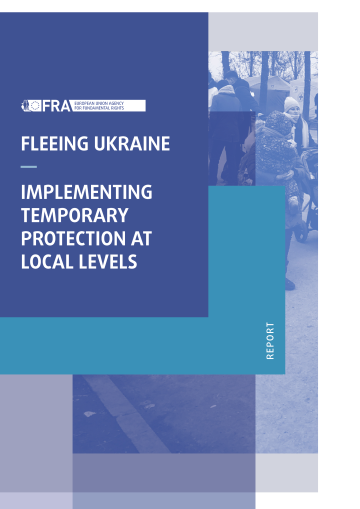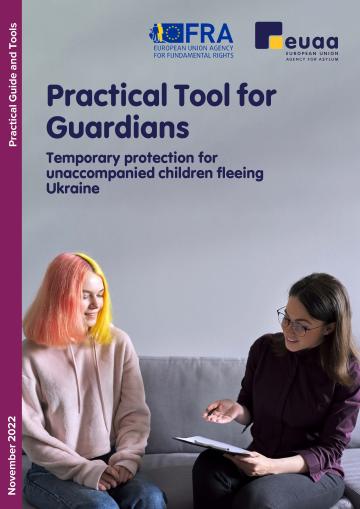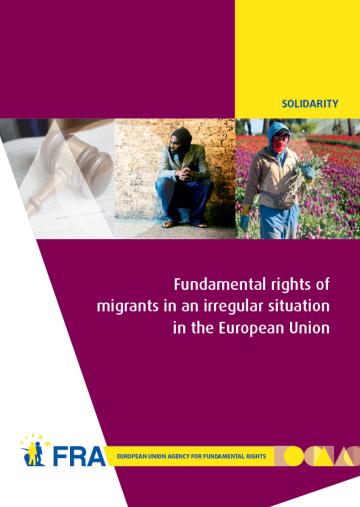The report draws on the findings of desk research and consultations with local and national authorities in 2022 and 2023. It is based on desk research and individual consultations with local authorities and organisations, primarily carried out between November 2022 and March 2023, in the 26 selected locations across 12 EU Member States. Consultations included written or oral input provided by local authorities responsible for supporting temporary protection beneficiaries to access housing, education, employment and medical care. In a few cases, where it is mainly national law that addresses these policy fields, national authorities were consulted.
FRA’s multidisciplinary research network, Franet, conducted desk research. On this basis, it later carried out detailed, targeted interviews and consultations with local authorities, carried out in-person or over the phone, and email exchanges. Table 1 shows the total number of authorities consulted, either through in-person or phone interviews or email requests (see also Annex 2). In some cases, more than one staff member was interviewed and some stakeholders were consulted more than once. National authorities were also consulted where they are primarily responsible for certain aspects of temporary protection-related rights.
The consultations helped to illustrate the measures taken and challenges arising in practice at the specific location. The examples provided in the text are not representative of the Member States. Some local authorities had to decline requests for consultation because they were overloaded with work or the locally responsible resource people could not be identified. In those few cases, the research reverted to local support organisations, including NGOs.
Table 1 – Number of authorities/stakeholders consulted, November 2022 to March 2023
|
Member State and locations |
Total number of consulted authorities |
Local-level authorities |
National-level authorities |
|
Austria (Graz/Styria, Vienna) |
6 |
6 |
|
|
Belgium (Bruges, Brussels) |
11 |
11 |
|
|
Czechia (Prague, Trutnov) |
7 |
7 |
|
|
Estonia (Saaremaa, Tallinn) |
8 |
3 |
5 |
|
France (Alpes-Maritimes, Île-de-France) |
7 |
5 |
2 |
|
Germany (Berlin, Stuttgart, Uckermark) |
14 |
14 |
|
|
Ireland (Dublin, Kerry) |
9 |
7 |
2 |
|
Italy (Naples, Rome) |
4 |
4 |
|
|
Poland (Katowice, Lublin, Warsaw) |
10 |
10 |
|
|
Romania (Bucharest, Constanța) |
6 |
6 |
|
|
Slovakia (Bratislava, Nitra) |
17 |
15 |
2 |
|
Sweden (Gothenburg, Malmö) |
12 |
12 |
|
|
Total |
111 |
100 |
11 |
Alternative text: . Table 1 lists the total number of authorities/stakeholders consulted per country covered by this report. Slovakia with 14 consultations leads the list, followed by Germany with 14 and Poland with 10. Italy with 4 consultations closes the list.
In addition, FRA carried out online consultations with 30 local organisations supporting temporary protection beneficiaries in 17 of the 26 locations covered by this report, in May and June 2023 (see Annex 3). They included organisations providing support to access housing (9 organisations), education and childcare (13 organisations), employment (12 organisations) and healthcare (8 organisations).
The consultations focused primarily on challenges and needs to improve the provision of support in these areas and were an opportunity to cross-check information obtained through the interviews with local authorities. They combined open and closed questions on the main challenges encountered, prepared in light of the findings of FRA’s Fleeing Ukraine survey of displaced people’s experiences in the EU. The analysis did not reflect replies indicating ‘don’t know’ unless they had a particular meaning for the specific question. Examples from the online consultations are presented in boxes.
FRA invited organisations to contribute to the consultation if they had agreed to be contacted in the research that Franet carried out. FRA also invited interested partners of its Fundamental Rights Platform, which is the agency’s channel for cooperation and information exchange with civil society organisations working on fundamental rights in the EU. The online consultation was open between 3 May and 16 June 2023.
Given the small number of respondents, the results cannot be considered representative. They are merely examples of challenges that support organisations experienced in their areas of work and locations. The results of the consultation are included separate boxes throughout the report. Figures reflecting quantitative data are based on the numbers of respondents to the specific questions.
National authorities checked the report for factual accuracy in July 2023.
This report refers to those fleeing Russia’s war of aggression against Ukraine as ‘displaced people’. They include Ukrainian nationals and other non-EU nationals. A ‘refugee’, as defined in the 1951 Refugee Convention (introductory note), is “someone who is unable or unwilling to return to their country of origin owing to a well-founded fear of being persecuted for reasons of race, religion, nationality, membership of a particular social group, or political opinion” and who has crossed an international border to find safety in another (here, EU) country. Refugees may or may not be beneficiaries of the TPD.











